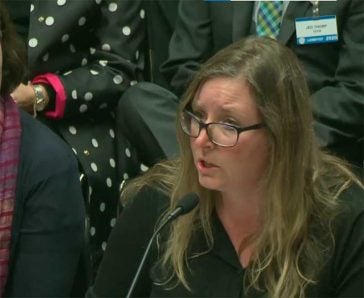
With mounting evidence about the dangers of exposure to PFAS, renewed efforts are underway in Rhode Island to enforce PFAS regulations. State representatives have proposed a bill that would ban PFAS in food packaging, and another bill to set a state drinking water standard. Both were heard by the House Committee on Environment and Natural Resources in February of 2021, with the event covered by the Providence Journal, STEEP researchers Laurel Schaider and Angela Slitt testified in favor of both bills.
“Studies have linked these ‘forever chemicals’ to cancers, thyroid disorders, low birth rates and immune system impairments,” said Dr. Laurel Schaider at the hearing. “PFAS easily get into food from packaging,” she said, pointing to a study she conducted that found evidence of increased levels of the compounds in the bodies of people who eat more takeout food and microwave popcorn. “We need a class-based solution that phases out nonessential uses of PFAS,” Schaider said in support of the bills.
In her testimony, Dr. Angela Slitt emphasized how difficult it is for the body to metabolize PFAS due to the uniquely strong bonds between fluorine and carbon atoms, and that the chemicals are passed through the human body from mother to child, putting babies and infants at risk. “These are chemicals that cross the placenta,” she said. “They very easily get into breast milk. They easily get into cow’s milk.”***
*** Despite PFAS, the value of breast milk remains significant for early development of immune system, and the CDC continues to recommend 6 months of breastfeeding for newborns.

